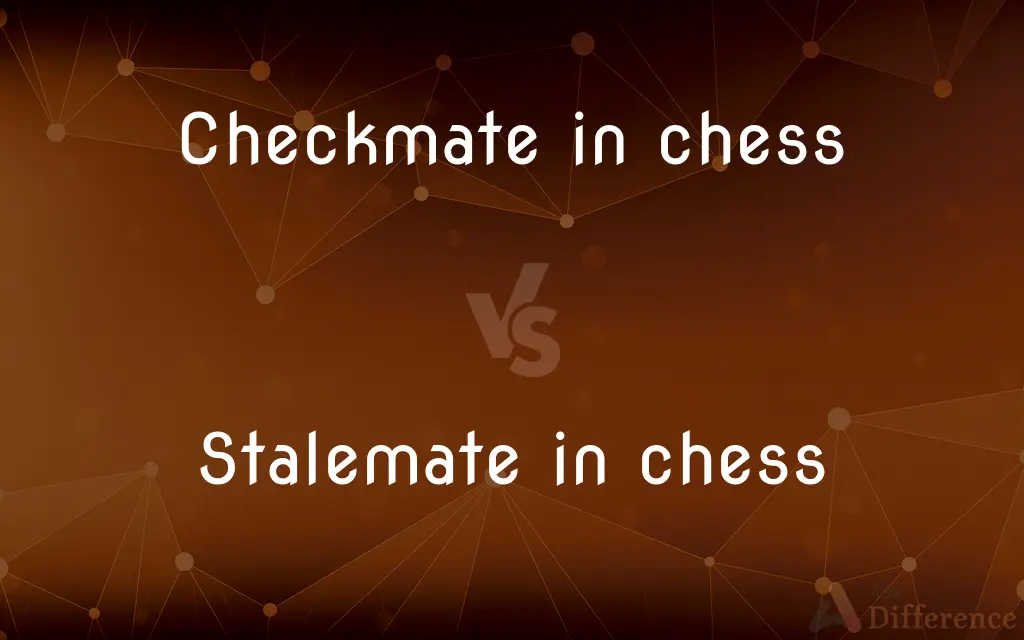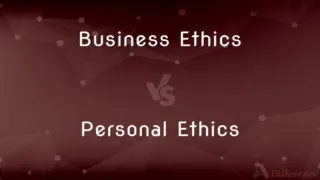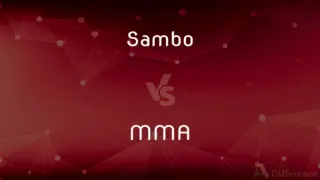Checkmate in chess vs. Stalemate in chess — What's the Difference?
Edited by Tayyaba Rehman — By Fiza Rafique — Published on December 20, 2023
In chess, checkmate occurs when a king is in threat and cannot escape, ending the game with a win for the attacking side. Stalemate, on the other hand, is when a player cannot make any legal moves and is not in check, resulting in a draw.

Difference Between Checkmate in chess and Stalemate in chess
Table of Contents
ADVERTISEMENT
Key Differences
In the intricate game of chess, checkmate and stalemate are two pivotal terms that signify different outcomes. Checkmate in chess marks the game's conclusion, where one player's king is under direct threat and cannot evade capture. This situation signifies a clear victory for the attacking player. Conversely, stalemate in chess is a scenario where a player, although not in check, has no permissible moves left. In this case, the game concludes, but neither player wins; it's a draw.
Understanding checkmate in chess is fundamental for victory. A player endeavors to position their pieces so that the opponent's king is trapped. Every move the besieged player tries either exposes their king to capture or remains within the attacking pieces' line of sight. Stalemate in chess, in contrast, presents a more complex situation. Here, a player's pieces are so restricted that they cannot move without putting their own king in check.
Strategically, players aim for checkmate in chess, as it assures them a win. It's the ultimate goal, and achieving it demands careful planning, tactics, and foresight. Stalemate in chess, on the other hand, can sometimes be an unintentional result, especially among beginners. At other times, a player facing inevitable defeat might cleverly maneuver their pieces to force a stalemate, thus preventing a loss.
For those new to chess, distinguishing between checkmate and stalemate can be challenging. Checkmate is definitive, leaving no ambiguity about the winner. Stalemate in chess, however, can be both surprising and frustrating, as it abruptly ends the game without a clear victor.
In essence, while both terms indicate the game's end, checkmate celebrates a win for one player, while stalemate recognizes the gridlock and concludes the game in a draw.
ADVERTISEMENT
Comparison Chart
Definition
King is under threat and cannot escape.
Player has no legal moves and is not in check.
Result
Win for the attacking player.
Game ends in a draw.
Goal
Achieving checkmate is the primary objective.
Can be a strategic move to avoid defeat.
Player's Position
One player is dominant; the other is in a losing position.
Both players are in a deadlock without a clear victor.
Game Phase
Game concludes immediately.
Game concludes immediately.
Compare with Definitions
Checkmate in chess
The primary objective in chess, resulting in victory.
She studied the board intently, searching for a path to checkmate.
Stalemate in chess
Occurs when all possible moves would put one's own king in check.
Despite having more pieces, she found herself in a stalemate situation.
Checkmate in chess
A culmination of strategic moves leading to the opponent's defeat.
With his rook and bishop, he set a trap that led to checkmate.
Stalemate in chess
Represents a deadlock in the game of chess.
Both players acknowledged the stalemate and agreed to a rematch.
Checkmate in chess
Indicates the end of the game with a clear winner.
The grandmaster's swift checkmate stunned the audience.
Stalemate in chess
A situation in chess where a player has no legal moves and their king isn't in check.
The game abruptly ended in a stalemate, much to everyone's surprise.
Checkmate in chess
A situation in chess where the king is directly threatened and cannot evade capture.
After a series of well-calculated moves, he declared checkmate.
Stalemate in chess
Can be a strategic move to prevent an impending defeat.
Facing a stronger opponent, he skillfully forced a stalemate.
Checkmate in chess
An unambiguous declaration of triumph in chess.
Achieving checkmate in fewer than ten moves is a remarkable feat.
Stalemate in chess
Results in a draw, with neither player emerging victorious.
Seeing no path to victory, he maneuvered his pieces into a stalemate.
Common Curiosities
What happens after a checkmate in chess?
After checkmate, the game ends, and the player delivering the checkmate wins.
Can you avoid checkmate in chess?
Players can try to avoid checkmate using various tactics, but once checkmate is declared, it's final.
Is checkmate always achievable?
In certain board configurations, checkmate is inevitable, but in others, it might be unreachable.
Is stalemate a common occurrence in professional chess?
While not rare, stalemates are less common in professional games than checkmates.
If there's a stalemate, who wins?
In a stalemate, no one wins; the game is declared a draw.
Can stalemate be a strategic move?
Yes, players facing defeat might force a stalemate to avoid a loss.
How can one distinguish between checkmate and stalemate?
In checkmate, the king is in check and can't move out of it. In stalemate, the player has no legal moves but isn't in check.
Can you escape a checkmate threat?
If checkmate is declared, it's final. But if it's just a threat, players can use tactics to evade it.
Are there techniques to force checkmate with limited pieces?
Yes, there are recognized techniques, like the king and rook versus king checkmate.
Does every chess game end in either checkmate or stalemate?
No, games can also end in draws due to other reasons like insufficient material or a threefold repetition.
What's the quickest possible checkmate in chess?
The quickest checkmate is the two-move "fool's mate."
How often does stalemate occur in beginner games?
Stalemates are more frequent in beginner games due to less strategic depth.
Can stalemate happen in the middle game?
While rarer, stalemates can technically occur at any point in the game.
Is achieving stalemate seen as a victory for the underdog?
While not a formal victory, achieving a stalemate against a stronger opponent can be considered a moral win.
What's the emotional difference between facing checkmate and stalemate?
Facing checkmate often brings disappointment, while a stalemate might bring relief if one was in a losing position.
Share Your Discovery

Previous Comparison
Business Ethics vs. Personal Ethics
Next Comparison
Sambo vs. MMAAuthor Spotlight
Written by
Fiza RafiqueFiza Rafique is a skilled content writer at AskDifference.com, where she meticulously refines and enhances written pieces. Drawing from her vast editorial expertise, Fiza ensures clarity, accuracy, and precision in every article. Passionate about language, she continually seeks to elevate the quality of content for readers worldwide.
Edited by
Tayyaba RehmanTayyaba Rehman is a distinguished writer, currently serving as a primary contributor to askdifference.com. As a researcher in semantics and etymology, Tayyaba's passion for the complexity of languages and their distinctions has found a perfect home on the platform. Tayyaba delves into the intricacies of language, distinguishing between commonly confused words and phrases, thereby providing clarity for readers worldwide.













































